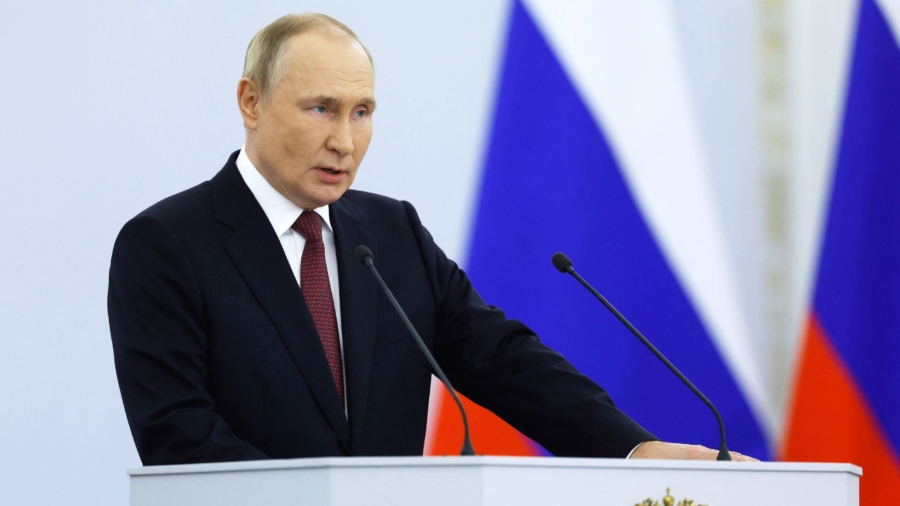KYIV, Ukraine—Russian President Vladimir Putin has signed laws formally absorbing four Ukrainian regions into Russia.
The documents finalizing the annexation were published on a Russian government website on Wednesday morning.
Earlier this week, both houses of the Russian parliament ratified treaties making the Donetsk, Luhansk, Kherson, and Zaporizhzhia regions part of Russia. That followed Kremlin-orchestrated “referendums” in the four regions that Ukraine and the West have rejected as a sham.
On the ground, Moscow’s war in Ukraine has entered a new, more dangerous phase.
The borders of the territories Russia is claiming still remain unclear, but the Kremlin has vowed to defend Russia’s territory—the newly absorbed regions too—with any means at its disposal, including nuclear weapons.
Ukrainian President Volodymyr Zelenskyy responded to the annexation by announcing a fast-track application to join NATO and formally ruling out talks with Russia. Zelenskyy’s decree, released Tuesday, declares that holding negotiations with Putin has become impossible after his decision to take over the four regions of Ukraine.
Russia and Ukraine gave conflicting assessments Wednesday of a Ukrainian offensive in the strategic southern Kherson region—one of the four areas that Russia is annexing.

A Russian-installed official in the Kherson region insisted that Ukrainian advances in the region have been halted.
Kirill Stremousov, in comments to the state-run news agency RIA Novosti, said that “as of this morning … there are no movements” by Kyiv’s forces. He vowed that “they won’t enter (the city of) Kherson, it is impossible.”
However, Kyiv’s military claimed Wednesday they have recaptured more villages in the Kherson region as a part of their counteroffensive effort. Operational Command South claimed that the Ukrainian flag has been raised above seven villages previously occupied by the Russians.
On the battlefield on Wednesday morning, multiple explosions rocked Bila Tserkva, setting off fires at what were described as infrastructure facilities in the city to the south of the capital Kyiv, regional leader Oleksiy Kuleba said on Telegram.
Early indications are that the city was attacked by so-called kamikaze or suicide drones, he said.
Bila Tserkva is about 80 kilometers (50 miles) south of Kyiv.
Russia has increasingly been using suicide drones in recent weeks, posing a new challenge to Ukrainian defenses. The unmanned vehicles can stay aloft for long periods of time before diving into their targets and detonating their payload at the last moment.
Many of the earlier attacks by the Iranian-made drones happened in the south of the country and not near the capital, which hasn’t been targeted for weeks.
In a later post, Kuleba said that a total of six Shahed-136 drones struck the city, one of the largest in the region after Kyiv itself. One person was wounded in the attacks.
Dozens of rescue workers were on the scene and still working to extinguish the fires hours after the attacks were reported, he said.
Elsewhere in Ukraine, at least five civilians have been killed and eight others have been wounded by the latest Russian shelling, according to the country’s presidential office.
In the Donetsk region, the Russian forces shelled eight towns and villages, according to Donetsk Gov. Pavlo Kyrylenko.
By Adam Schreck


